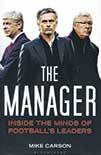 Inside the minds of football’s leaders
Inside the minds of football’s leaders
by Mike Carson
Bloomsbury in association with the League Managers Association, £16.99
Reviewed by Barney Ronay
From WSC 321 November 2013
Often when reviewing a book it is customary to quote one of the best bits at the start to give a little flavour of what treats can be found within its pages. This isn’t an easy thing to do with The Manager. Mainly because there aren’t any best bits, or even any good bits to speak of – apart from occasional unintentionally good bits, such as the passage that starts off by quoting St Francis of Assisi and Stephen Covey “best-selling author of The Seven Habits Of Highly Effective People” (me neither) before ploughing into a passage on the philosophy of Neil Warnock (yes that one).
On the other hand despite its lack of good bits, its muscular banality – the literary equivalent of a long and tedious game of squash – The Manager is also a considerable achievement in its own right. Most notably it takes one of the more mercurial and thrillingly baroque aspects of English football and turns it into something so unrelentingly laborious that this book, which is sponsored by the League Managers Association and the Premier League, should come with a warning not to operate heavy machinery or drive late at night should you accidentally find yourself reading more than a paragraph or two.
Yet this is perhaps a little unfair. In reality The Manager is barely a book at all, more a kind of how-to guide aimed not at football fans but at business-minded people: leaders, rain-makers, ladder-climbers, even football managers themselves. This lumping together of football and corporate managerdom is a process that has been in train for some time, but it is given a fresh twist here. The first secretary-mangers would often borrow the mannerisms and vocabulary of clerks or factory foremen.
In the 1950s a socially mobile breed of manager took up the coat and hat of the ambitious junior sales manager. The 1980s brought with them a breed of Thatcherite manager-made-good, the Big Ron-ish notion of the manager as self-made man and flash git. With the celebrification of the modern manager – and with football generally bleeding into every other walk of life – this is now a process that has increasingly been reversed. The corporate world looks to football, borrowing the manager’s habits, mannerisms and – as here – musings on success, the leadership of men and the rest of it.
Perhaps for this reason the book seems to describe an unfamiliar footballing world. In part this is because it presents a version of football completely robbed of any humour, becoming in the process at times quite funny – favourite chapter heading: “Seeing The Bigger Picture (Harry Redknapp)” – and in part this is because it is simply very dull.
Poring over the cracker motto banalities (“if there is a lesson to take from this it is the tendency of great leaders to take ownership of their situations. In the words of Mick McCarthy…”) it is tempting to conclude that the real problem with The Manager is managers themselves. When they talk about football English managers just aren’t very interesting. Instead they are famously dull, anti-academic and light on any coherent management theory. Particularly when, as here, what they have to say is presented unquestioningly, without context, irony, analysis or any of the things most people who like football like about football.